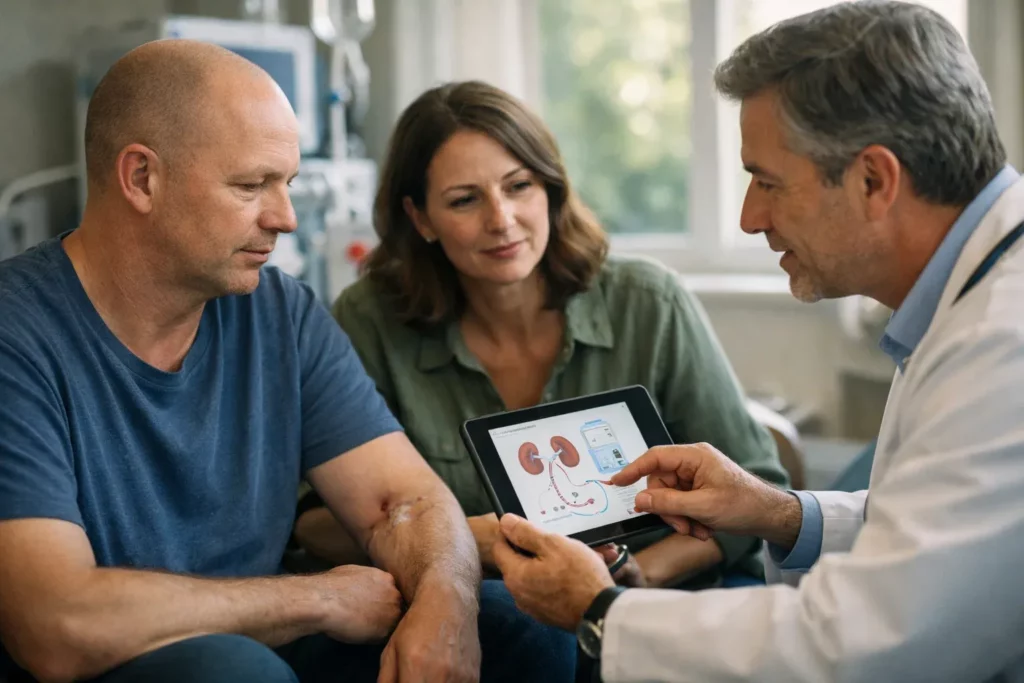Managing kidney health: Why is it so important?
Proper kidney health contributes to your body’s overall function. This is because the kidneys’ job
is to clean blood and filter waste out of your system. In this sense, a damaged kidney means a
damaged filter that causes a buildup of waste products in your body.
Additionally, low kidney function isn’t typically a noticeable problem. Patients don’t feel any one
sensation that directly indicates kidney failure. Rather, low kidney activity manifests through
other symptoms and side effects observable in your overall health – fluid retention in the limbs,
shortness of breath, and difficult-to-control blood pressure are some examples.
Empowering kidney care through knowledge
Empowered patients make the whole process of understanding and acting on kidney disease
smoother and easier on themselves. Often, it results in the patient feeling more confident in
understanding their body and better equipped to explain discrepancies they notice impacting
their health.
So how can patients go about educating and priming themselves for their health check-ups?
Though it may seem counter-intuitive, excessive “googling” is not the solution. This is because
in addition to the sea of questionable sources Google presents you with, it can be challenging to
navigate if you don’t know which terms to search for your specific kidney issue. There are a lot
of complex topics that online resources fail to explain. To avoid misinformation and confusion,
let’s take a look at a few resources that can help guide your research.
Resources
For conducting outside research on your kidney needs, our team likes to recommend the
National Kidney Foundation’s website. As a nationally recognized entity, their coverage of
kidney health information is clear, credible, and easy to read for many. For other sources you
may be interested in, it is always nice to consult with your local clinic for their resources! At
ANC, for instance, we work diligently with our providers to produce blog content that is timely,
relevant, and suitable for holistic kidney education!
Additional resources include “Kidney Smart”, a recurring class that encourages patients to take
action toward their health by covering topics ranging from the causes of kidney disease
to diet and nutrition information. Classes are offered at ANC’s Maplewood location a few times a
month. Be sure to call our office to learn more!
Be in the know: Factors that impact your kidney health
Prevention and Early Detection
Recall earlier? We discussed how those who have kidney disease, don’t feel any obvious pain
or discomfort. Kidney disease is typically identified through routine labs. To lead successful
prevention efforts, it is vital that you attend your annual physicals and routine appointments.
This is the first line of defense, especially if you haven’t had prior kidney health issues or a
family history of it.
It’s also good to know your blood pressure so you can monitor any co-morbidities. Some risk
factors to be mindful of include prior experiences with bladder infections, kidney stones, gout,
and more. Be aware of your health history to inform your physician at your next appointment so
they can properly screen you!
Health and Diet
Diet is a huge factor in supporting kidney function, but what constitutes a “healthy” diet? This
can look different depending on the person; however, when your physician recommends a
healthy, kidney-safe diet, they’re referring to a diet that includes all the food groups and limits
salty and/or processed foods. A general rule of thumb is if you can look at a food and
confidently know where it came from – fruits, vegetables, clean meat, etc. – you’re on the right
track.
Oftentimes, patients reach to the internet and look up terms like “kidney diet”, and can become
very overwhelmed by the results. It is strongly encouraged to talk to your nephrologist before
you embark on a radical diet change. The “kidney diets” you read on the internet are normally
diets geared for patients at or approaching dialysis and are not necessary for all kidney patients.
Plus, there’s no harm in checking with your provider!
For those who prefer a more structured approach to formulating a suitable diet for kidney
disease, consult your doctor or dietitian to coordinate a specialized plan. Our clinic also offers
templates and handouts with nutritional tips and best practices. We encourage you to reach out
or ask our team for help acquiring these if you’re interested!





